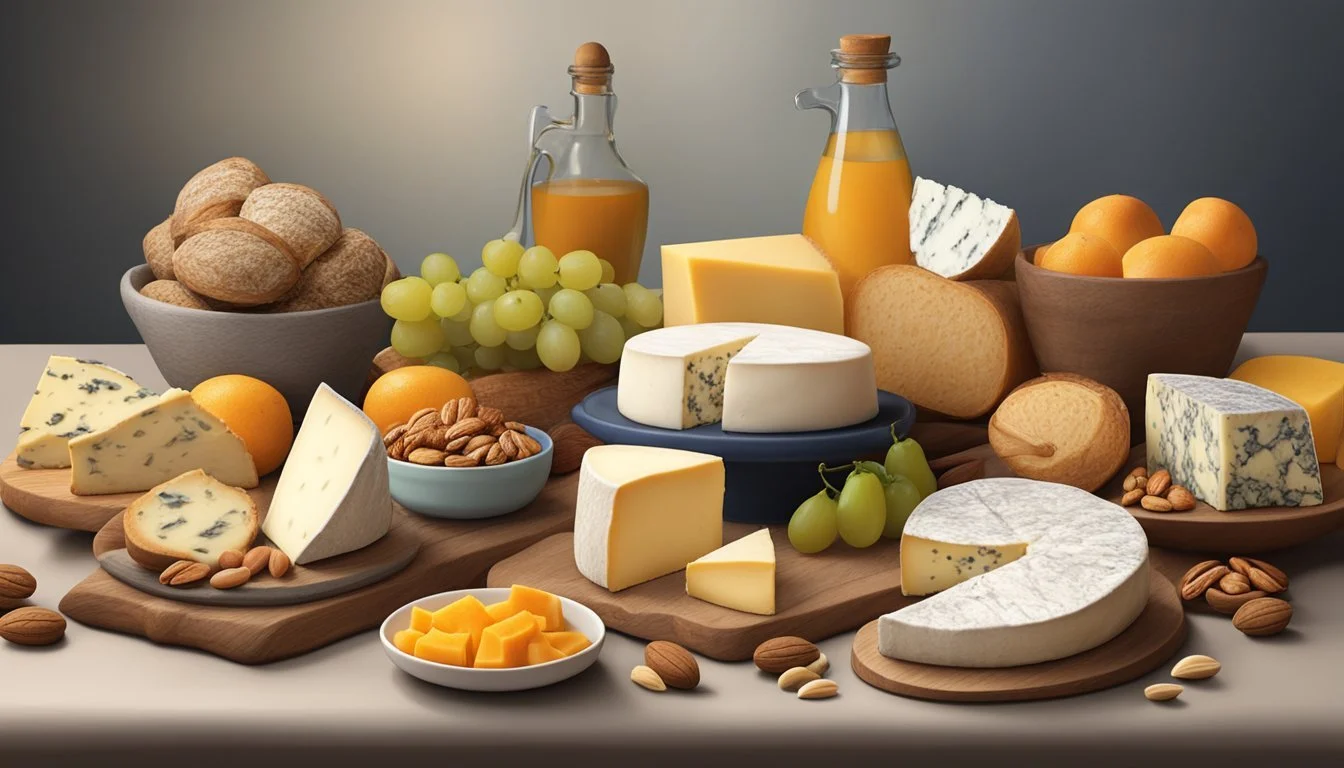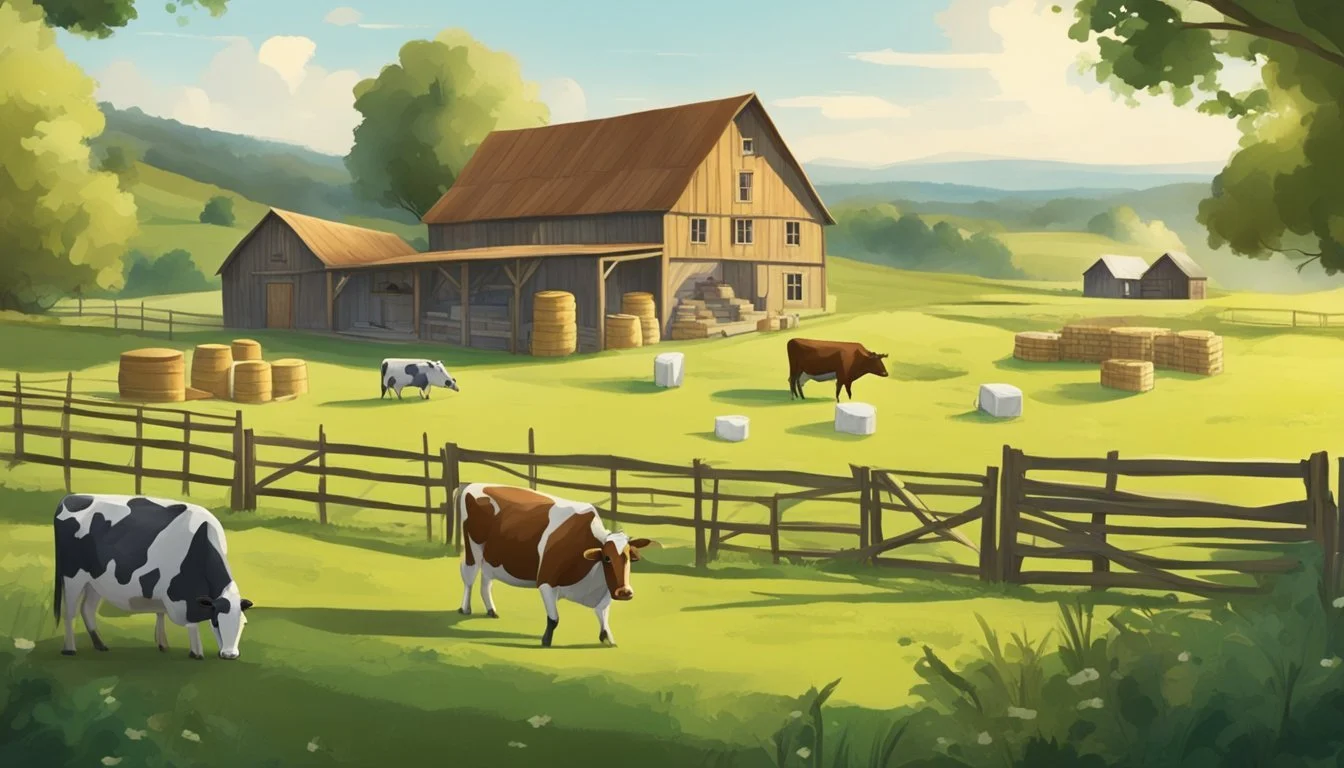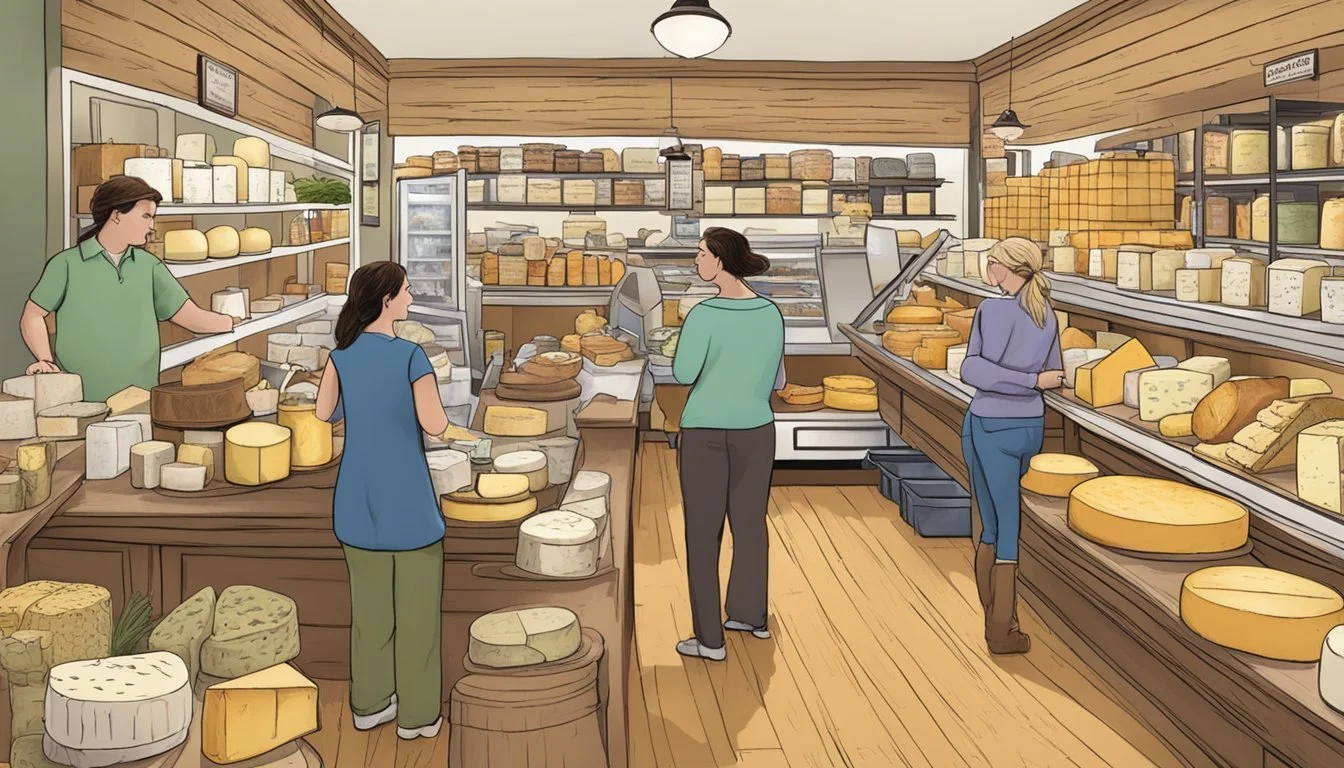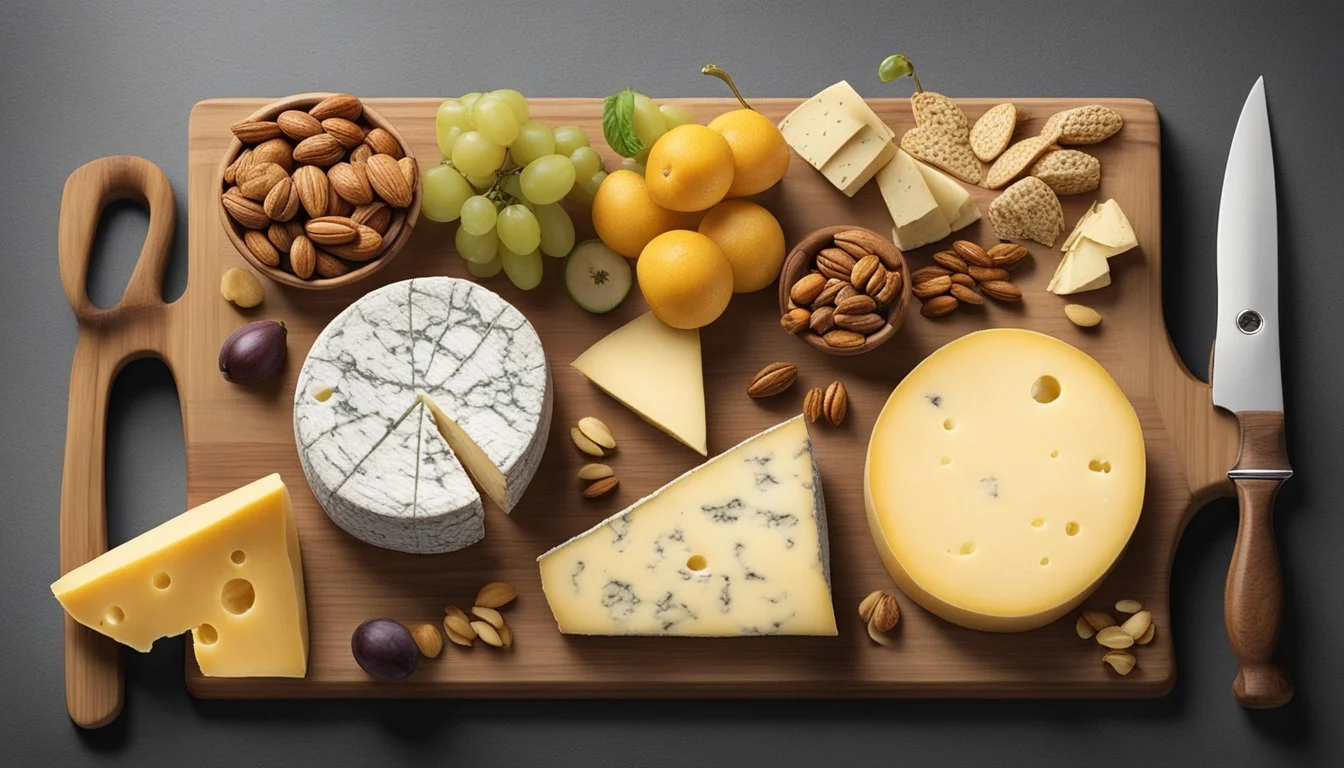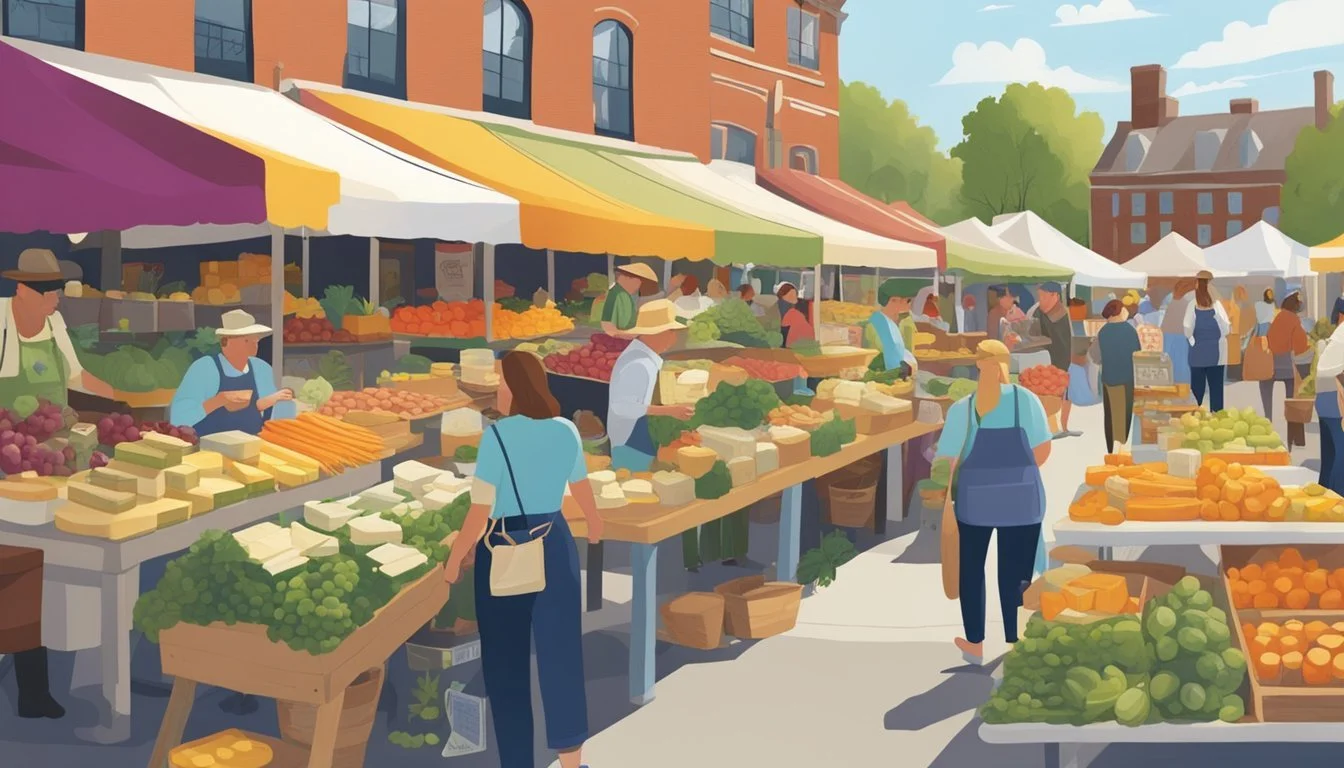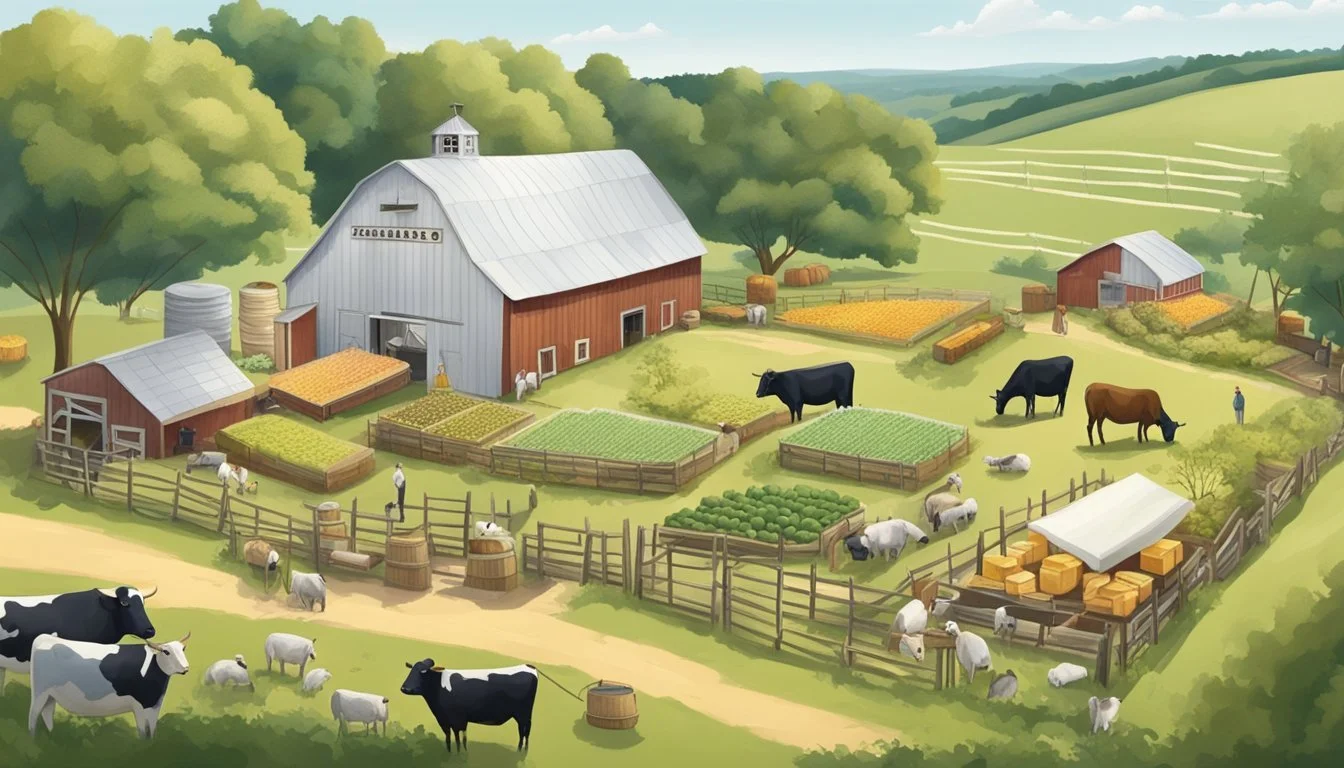Rhode Island Artisan Cheese
A Guide to the Ocean State's Finest Cheeses
Rhode Island may be the smallest state in the United States, but it boasts a burgeoning artisan cheese (how long does cheese last?)scene that is as rich and varied as any of its larger counterparts. Throughout the Ocean State, family-owned creameries and cheese (What wine goes well with cheese?) shops pride themselves on creating products that reflect the local terroir. These enterprises often use hormone-free milk from local dairies to craft their unique cheeses, ranging from traditional cheddars and goudas to more innovative and specialty blends.
The cheese-making renaissance in Rhode Island has led to a bevy of options for both connoisseurs and casual fans alike. Farmers’ markets throughout the state play host to these artisanal products, giving consumers direct access to the creameries and the cheesemakers. Shops and markets such as Narragansett Creamery in Providence, Rind Cheese Shop in Barrington, and the Cheese Wheel Village Market in Tiverton, offer not only a variety of locally-made cheeses but also an array of gourmet food items that complement the cheese-eating experience.
This uptick in specialty cheese shops is evidence of the growing appetite for locally-sourced and crafted foods. With a dedication to quality and a connection to the community, Rhode Island’s cheesemakers are at the forefront of this movement, ensuring that even the smallest state can leave a significant impact on the cheese-making industry.
History of Artisan Cheese in Rhode Island
Rhode Island, a New England gem, has cultivated a rich tradition of artisan cheese, reflective of European influences and local innovation. The state's cheese-making began to thrive with the revival of the artisanal food movement, embracing heritage techniques and fresh, hormone-free milk from local farms.
Louella Hill, also known as the 'Milkmaid', is one figure who has been pivotal in shaping Rhode Island’s artisan cheese scene. With a dedication to traditional practices, she crafts cheese curds by hand in Providence, ensuring premium quality. Rhode Island's cheese is celebrated for its connection to the land and history, embodying a European legacy while evolving with New England's local character.
Artisanal cheese in Rhode Island reflects the state's commitment to sustainability and local business. Producers in Providence and surrounding areas expertly blend time-honored methods with modern twists, resulting in a range of unique cheeses that capture the essence of Rhode Island.
Narragansett Creamery, a family-owned gem, stands out among Rhode Island's artisanal cheese producers. They offer an array of award-winning cheeses made from local, hormone-free milk, demonstrating the state’s dedication to high-quality, sustainable craftsmanship.
Here is a brief overview of Rhode Island's artisan cheese history:
Revived in recent decades, aligning with the local and sustainable food movement.
Influenced by European cheese-making traditions, adapted to New England's terroir.
Features key figures like Louella Hill contributing to the craft’s growth.
Embraces small-scale, family-run businesses like Narragansett Creamery.
Rich in variety, Rhode Island's artisan cheeses include fresh curds and aged specialties.
Selling points include local farmers' markets, contributing to the community-based food system.
Types of Rhode Island Artisan Cheeses
Rhode Island's artisan cheese producers craft a range of cheeses that are as distinctive as the state itself. From creamy fresh cheeses (What wine goes well with fresh cheeses?) to robust aged varieties and specialty creations, local creameries are known for their quality and innovation.
Fresh Cheeses
Rhode Island creameries produce an exquisite selection of fresh cheeses. Notable among them is the Mozzarella, crafted in small batches to ensure a delicate texture and optimum freshness. Another variety cherished by cheese aficionados includes Burrata, with its creamy center of Stracciatella and rich outer shell of mozzarella. The Renaissance Ricotta is another local favorite, celebrated for its smooth creaminess and versatility in recipes.
Aged Cheeses
The aged cheeses (What wine goes well with aged cheeses?) from Rhode Island's artisanal producers feature complex flavors developed over time. The aged Gouda-Style Cheese is a prime example, boasting a deep flavor profile and a firm yet yielding texture. These cheeses reflect a mastery of the aging process, creating a taste that lingers pleasantly long after the last bite.
Specialty Cheeses
Rhode Island's specialty cheeses include unique creations like the award-winning Salty Sea Feta and Crescendo. Salty Sea Feta is known for its balanced brininess and firm crumbly texture, making it a standout addition to salads and Mediterranean dishes. On the other hand, Crescendo is a creamy, rindless cheese whose tangy notes and velvety consistency have garnered it critical acclaim. These distinctive cheeses embody the innovation and skill of Rhode Island's artisan cheese makers.
Local Ingredients and Production
Rhode Island's artisan cheese industry prides itself on sourcing local, hormone-free milk and utilizing traditional aging processes. The emphasis on local ingredients ensures not only the freshness but also contributes to the distinct regional flavors of the cheeses produced.
Milk Sources
The majority of Rhode Island's artisan cheesemakers obtain their milk from local dairies employing hormone-free practices to ensure the highest quality. For example, Sweet and Salty Farm in Little Compton utilizes grass-fed Jersey cows for their rich, creamy milk, which is pivotal in developing the texture and flavor profile of their cheeses.
Salt and Aging Processes
Salt is a crucial ingredient in cheese-making, often sourced locally to maintain the regional touch. The salt aids in preservation, flavor, and the development of a proper rind. In the aging process, cheesemakers employ time-honored techniques, adjusting temperature and humidity to develop desired textures and flavors. For example, many Rhode Island cheesemakers use the following methods:
Dry salting: Applying salt directly to the cheese surface
Brine bathing: Immersing cheese in a saltwater solution
Cultures and rennet are also integral to the cheese-making process, with many producers opting for natural and local sources where possible to further the distinctness of their products. The careful combination of these elements contributes significantly to the artisanal quality of Rhode Island's cheeses.
Popular Rhode Island Cheese Shops
Rhode Island shines as a beacon for cheese aficionados with several renowned cheese shops and creameries offering an array of artisan cheeses.
Providence and Surrounding Areas
Narragansett Creamery stands out in Providence, not only as a family-owned establishment but also as a producer of more than fifteen varieties of prize-winning cheeses. Visitors to the creamery can indulge in the creamy Crescendo, the famous Salty Sea Feta, and a variety of other cheeses such as mozzarella, Gouda, ricotta, and burrata.
The Cheese Wheel Village Market, located in the heart of Rhode Island, welcomes customers with a wide selection of high-quality artisan cheeses, complemented by an assortment of charcuterie (What wine goes well with charcuterie?), jams, and local provisions. Their offerings are available Tuesday through Sunday from 10 am to 5 pm.
Edgewood Cheese Shop and Eatery in Cranston caters to those searching for an intimate cheese shopping experience with a carefully curated selection of cheeses as well as sandwiches and other cheese-centric dishes for those looking to enjoy a bite on-site.
Whole Foods, a national supermarket chain known for its selection of organic products, also offers a range of gourmet cheeses perfect for those seeking both local and international options.
Beyond the State Capital
Moving outside the confines of Rhode Island's capital, cheese lovers can find exquisite selections across the state.
Milk & Honey an artisanal cheese purveyor, boasts an eclectic collection of cheeses along with other delicacies to complement any cheese board. They place a strong emphasis on local and gourmet products, ensuring customers have access to both domestic and imported selections.
Through these shops and markets, Rhode Island provides a rich tapestry of cheese experiences for locals and visitors alike, each establishment contributing to the state's reputation as a destination for exceptional cheeses.
Pairing Rhode Island Artisan Cheeses
Pairing local cheeses from Rhode Island with the right accompaniment enhances their unique flavors. Rhode Island's homegrown cheeses match well with a variety of beverages and foods, each combination aiming to elevate the tasting experience.
Accompanying Beverages
Wine: Artisan cheeses from Rhode Island pair splendidly with a variety of wines. A robust Pinot Noir, with its mix of fruitiness and earthiness, complements the creamy textures and complex flavors of these cheeses.
Cheese Type Recommended Wine Soft cheese Sparkling Wine Aged cheese Full-bodied Red Wine Fresh cheese Light-bodied White
Craft Beer: Craft beers, particularly those brewed locally, also make excellent partners. The malty sweetness of an ale can counterbalance the saltiness of the cheese, while a crisp lager may cleanse the palate between rich bites.
Cheese Type Recommended Beer Creamy cheese Stout or Porter Sharp cheese IPA Mild cheese Pilsner or Lager
Complementary Foods
Bread and Crackers: Rhode Island's cheeses can be enjoyed on a slice of crusty bread or artisan crackers which provide a neutral base that allows the cheese's flavor to stand out.
Bold cheeses: Multi-grain bread
Soft cheeses (What wine goes well with soft cheeses?): Water crackers
Fruit and Nuts: Fresh fruit like apples and pears or dried fruits (how long does dried fruit last?) provide sweetness that can accentuate the flavors of cheese, while a selection of nuts (how long do nuts last?) adds texture and earthy notes.
Cheese Companion Type Fresh Cheese Grapes, Apples Aged Cheese Dried Figs (how long do dried figs last?), Almonds
Olives, Jams, and Olive Oil: Briny olives cut through the richness, while jams introduce a touch of sweetness. A drizzle of olive oil on fresh cheese enhances its inherent flavors.
Olives: Pair with sharp and salty cheeses
Jams: Best with creamy, spreadable cheeses
Olive oil: Compliments a young, tangy cheese
Each of these pairings aims to balance the flavors and textures of Rhode Island's artisan cheeses. By carefully selecting the right accompaniments, one can create memorable cheese boards that highlight the very best these local products have to offer.
Serving and Presentation
Artisan cheeses from Rhode Island are best appreciated when served correctly, with particular attention to the presentation on cheese boards and within charcuterie combinations.
Cheese Boards
In Rhode Island, the art of arranging a cheese board includes an array of local artisan cheeses, each allowing consumers to taste the distinct flavors of the Ocean State. Boards should be brought to room temperature before serving to enhance the cheeses' flavors and textures. For an appealing presentation, they can select a variety of hard and soft cheeses, such as aged cheddar or creamy chevre, arranged with spaces in between to prevent mingling of flavors.
Suggestion for a Rhode Island Cheese Board:
Hard Cheese: Grafton cheddar
Soft Cheese: Local chevre
Accompaniments: Artisan breads, jams, and local honey
Charcuterie Combinations
A charcuterie board incorporates a selection of meats and cured meats (What wine goes well with cured meats?), which may include prosciutto and pate, complementing the cheese selection. The savory taste of the meats pairs well with the complexity of Rhode Island's cheeses for a balanced flavor experience. Presentation should be done in a way that each meat is easily accessible and items are not overcrowded.
Components for a Rhode Island Charcuterie Board:
Cured Meats: Prosciutto, pate
Cheese: Crafted blue cheese
Extras: Mustards, pickled vegetables, (What wine goes well with pickled vegetables?) olives
Artisan Cheese in Rhode Island Cuisine
Rhode Island's rich culinary landscape features a strong tradition of artisan cheese-making. Local restaurants have embraced these regional delights, showcasing them in a variety of dishes and cheese platters.
Restaurants and Menus
Restaurants across Rhode Island frequently feature locally-made artisan cheeses on their menus, underlining the state’s commitment to supporting local creameries. Patrons can find a selection of these cheeses incorporated into appetizers, mains, and, most notably, cheese platters. A cheese platter in a Rhode Island restaurant often includes a careful selection of handcrafted cheeses from local producers like Narragansett Creamery, recognized for their hormone-free, locally-sourced artisan cheeses.
Menus tend to highlight the local provenance of the cheeses, sometimes offering a discount to customers who bring in new menus that feature the establishment’s cheeses. This practice not only incentivizes community engagement but also helps to build a repertoire of partnerships between a creamery and dining establishments. This symbiosis between local cheese shops and restaurants contributes to a robust artisanal food culture, with cheese at its heart.
Community and Culture
Rhode Island's artisan cheese community thrives on the collaboration between local dairy farms, creameries, and the supportive culture of family-owned businesses. These establishments not only contribute to the local economy but also to the cultural fabric of the state, bringing together cheese aficionados and casual consumers alike at various community events. Family names like Federico and DiMeo are synonymous with Rhode Island's artisan cheese scene, exemplifying the blend of traditional practices and modern culinary arts.
Local Cheese Events
Rhode Island plays host to a number of cheese-focused events fostering a sense of community and appreciation for local produce. The Pawtucket Wintertime Farmer's Market, for example, becomes a hub for cheese lovers to explore and sample products from the state's cheese artisans. Such events allow residents and visitors to engage directly with producers like the Federico Family, who share their passion and knowledge about their craft.
Family-Owned Businesses
Family-owned businesses are the heartbeat of Rhode Island's artisan cheese community. Angie and Jeff DiMeo stand out as proprietors who have reintroduced the tradition of cheese craftsmanship to Wayland Square with their boutique cheese shop. Their store is more than just a retail space; it serves as an educational platform where each cheese comes with a story, aligning customers with the DiMeo's journey from milk to market. The DiMeos' commitment to quality and community engagement exemplifies the spirit that propels the state's cheese culture forward.
Understanding Artisan Cheese Labels
When selecting an artisan cheese, whether it’s domestic or imported, the label offers invaluable insights. Labels on cheeses such as Buffalo Mozzarella, Caciocavallo, Queso Fresco, and Scamorza communicate crucial information about their origin, age, and production methods.
Origin: A geographical indication (GI) label signifies a product's specific place of origin and the qualities linked to that region.
Age: Labels indicate if cheeses are fresh, such as Queso Fresco, or aged for more complex flavors.
For instance, Buffalo Mozzarella typically carries a "Protected Designation of Origin" (PDO) mark ensuring it's produced in specific Italian regions using traditional methods. Caciocavallo, another Italian cheese, may bear a similar label.
In the United States, domestic artisan cheeses are often identified by their state or region. Rhode Island producers, for example, create distinctive cheeses using local, hormone-free milk. These details are typically highlighted on the packaging.
Fresh vs. Aged: Artisan cheese labels also differentiate between fresh and aged varieties. Fresh cheeses like Buffalo Mozzarella and Queso Fresco are often consumed soon after production, while aged varieties like Caciocavallo and Scamorza develop their character over time.
Furthermore, labels can indicate whether the cheese is made with raw or pasteurized milk. The majority of artisan cheeses in Rhode Island are made with pasteurized milk, a detail that's essential for consumers with safety concerns.
In conclusion, understanding these labeling elements empowers consumers to make informed choices about the artisan cheeses they purchase and enjoy.
Sustainable Practices and Local Economy
Rhode Island's artisan cheese industry positively impacts the local economy by fostering sustainable practices that resonate with both producers and consumers. Small-scale cheese producers in the state take a hands-on approach to their craft, often using milk from locally raised cows or goats to create distinctive cheeses that reflect the region's terroir.
Sustainable Farming Methods: Cheese artisans in areas such as Tiverton, Warren, and Portsmouth employ sustainable farming techniques, focusing on animal welfare and environmental health. They often choose to pasture-raise their livestock and avoid the use of antibiotics and growth hormones, resulting in high-quality raw milk that serves as the vital ingredient for their cheeses.
Narragansett Creamery, for instance, is known for sourcing milk locally and employing environmentally-friendly methods. Their use of local resources not only supports the area's dairy farmers but also minimizes transportation emissions.
Economic Impact: The emphasis on locally made cheese helps drive the economy through:
Creating jobs within the community
Supporting ancillary businesses such as charcuterie shops in Wayland Square
Attracting tourists seeking culinary experiences unique to Rhode Island
Distribution Expansion: The expansion of cheese distribution networks enables Rhode Island cheeses to find their way into markets beyond state borders, even reaching consumers in New York. This widening market presence showcases the state's commitment to quality and sustainability, further bolstering the local economy and establishing Rhode Island as a key player in the artisan cheese industry.
Comparing Rhode Island to Other Regions
Rhode Island's artisan cheese industry holds its own unique position within the broader context of regional and international cheese production. This compact state's cheese offerings are characterized by small-batch, high-quality products.
New England and Beyond
Rhode Island has established a niche for artisan cheese, with emphasis on small-scale production and local ingredients. It stands out from other New England states due to its focus on family-operated creameries and cheesemaking classes that often take inspiration from European methods. The state's purveyors, like Narragansett Creamery, showcase cheeses made with local, hormone-free milk, reflecting Rhode Island's commitment to quality.
In contrast, states like Massachusetts and Vermont are also renowned for their cheese, but with Vermont in particular being more widely recognized for its long-standing cheddar production. Vermont's cheese industry is substantial, featuring an array of farms and larger-scale operations that contribute significantly to the state's economy.
Beyond New England, New York has a robust dairy industry and is known for producing a broader variety of cheeses at a larger volume. The state's rich agricultural history and larger dairy farms facilitate a more extensive production line, which includes not only artisanal cheese but also mass-market products.
European countries like Italy, Germany, and Spain have long-standing traditions in cheesemaking, with each region bringing a unique flavor profile and technique to the table. Rhode Island artisans often draw on these traditions, creating American counterparts to Italian mozzarella, German quark, and Spanish manchego. The local approach often involves adapting these techniques to the regional tastes and milk varieties of Rhode Island.
While the influence of European techniques is evident, Rhode Island's cheesemakers put a distinctive stamp on their products, ensuring that the state's cheeses are truly reflective of its terroir.
Future of Rhode Island Artisan Cheese
As the artisan cheese market in Rhode Island flourishes, its trajectory suggests a continued rise. The number of specialty cheese shops has recently doubled, with even more openings anticipated. This growth signifies not only a thriving industry but also an expanding appreciation for artisanal products among consumers.
Artisan cheeses in Rhode Island benefit from a symbiotic relationship with local Grape and Gourmet businesses and Craft Beer breweries. These partnerships are expected to deepen, influencing the cheese-making process itself. For instance:
Grape and Gourmet partnerships may lead to cheese infused with local wines or complementary pairings marketed together.
Craft Beer collaborations could produce cheeses that incorporate beer flavors or share tasting notes, enhancing both the cheese and the beer experience.
Consumption Trends:
Artisan cheese demand: High
Retail evolution: Ongoing, with an increase in educational customer service
Market Dynamics:
New shops opening: Indicative of a robust market
Education and interaction: Key roles in customer engagement
Given these promising developments, the artisan cheese industry in Rhode Island is on a path to not just maintain its current success but to build upon it. Now more than ever, it's a promising time for cheese-makers and enthusiasts alike, as the state's palate for locally-made, high-quality cheese continues to sharpen.

